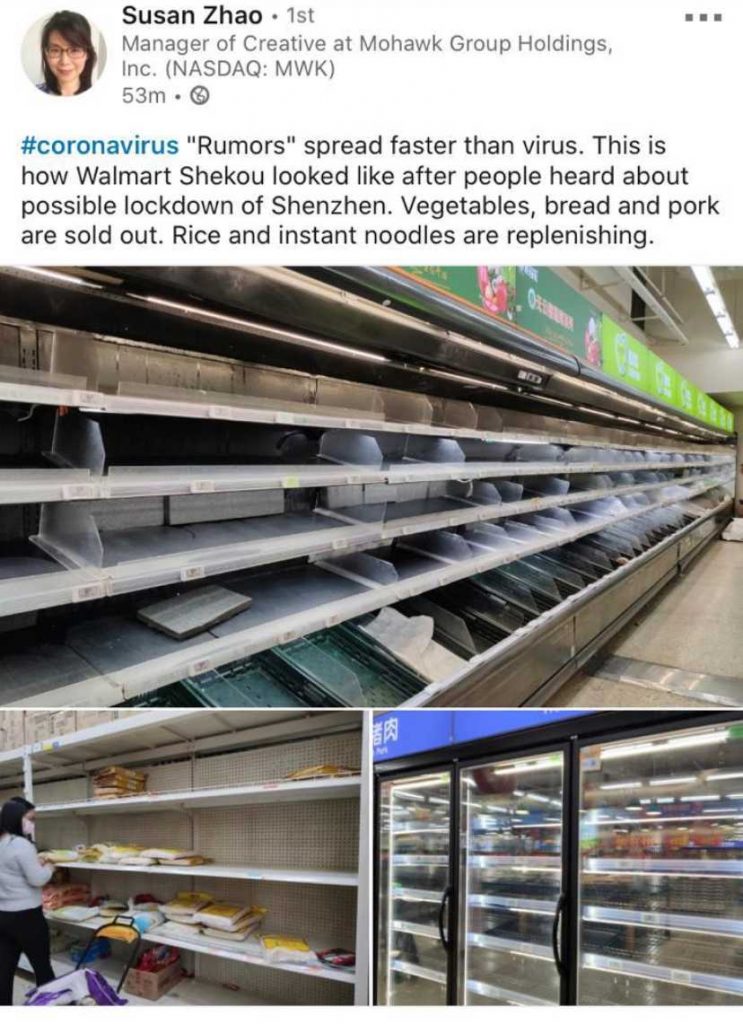As this new coronavirus is spreading at an astonishing speed, it will probably have a much greater impact than what importers expect.
Dan Harris wrote about all the implications from his point of view, and he made some good points. In this article, I simply wanted to make sure importers know what the situation is and how it might affect their suppliers.
It is now a national emergency in all of mainland China. The Wall Street Journal just wrote:
“We are now in a critical period of prevention and control,” Ma Xiaowei, head of China’s cabinet-level National Health Commission, said at a press briefing in Beijing on Sunday to deal with the unnamed coronavirus that has infected more than 2,700 people and killed at least 80, most of them in central China’s Hubei province.
These numbers are very probably under-estimated. If someone is sick and goes to a hospital (or, as is common, to a small clinic) that doesn’t have the proper test kit and/or is already too busy, it doesn’t count in these statistics.
To understand the situation, here are a few facts:
- The virus seems to be more contagious than SARS was in 2003. SARS was quite disruptive in South China, and about 800 people died.
- It is contagious during the incubation period (which was not the case with SARS), which might take longer than a week.
- Like SARS, this new coronavirus (2019-nCoV) evolved and adapted to human hosts. It was not very virulent at the very beginning, but has gotten more dangerous over time. It makes the outcome near impossible to forecast!
- Many people have been infected (officially, 2,700) but very few have already recovered.
- Several large cities in Hubei province (totally about 40 million people) have been locked down — nobody can go in, or go out, without proper authorization.
- A specialized infection control center is being built very fast (in a few days), to respond to the high number of confirmed cases.
- One large coastal city (Shantou, where a lot of export manufacturing is done) just said nobody is allowed to come in. Others might follow.
- This virus started contaminating many people just before Chinese New Year. Many people left the Wuhan area and went to their home towns in other cities/provinces. Many went on holiday in Thailand, in Japan, etc. and there is no way to estimate their numbers. Overall, the mayor of Wuhan estimated that 5 million people have left his city before the lockdown!!
- Right now is Chinese New Year, and local governments do all they can to keep people in their homes. It is the best way to limit the outbreak in the short term.
What are some manifestations of this exceptional situation?
Facial masks have been sold out for some time in China and Hong Kong. Some Amazon sellers in the USA are getting out of stock, as people are buying them and shipping them to their family & friends in China.
Here is a photo of a taxi driver in Beijing who is still working but taking all the precautions he can:
Wild rumours are circulating everywhere in China. For example, I saw in Linkedin that people emptied some supermarkets’ shelves:
Some journalists and some citizens are taking videos in Wuhan and reporting on the situation. It seems hospitals are totally overwhelmed, with dead bodies in the hallways and so on.
How will this affect the manufacturing sector?
The short answer is, nobody knows. It’s all pure speculation here.
Here are the key questions:
Will workers come back?
Many of them went back to their home towns. They will probably wait longer before returning to work. If the situation gets worse, they might wait for months.
There is a special case — the migrant workers from Hubei province and more particularly those from the Wuhan area. Some may be infected (maybe without knowing it). They may be unable to leave their city. If you have been working with a factory where the management and/or the operators come mostly from that area, that factory might not re-open…
What will be the conditions to resume production?
First, the government might impose some sanitary rules. Especially in certain sectors (food, medical devices…).
The government might simply postpone the opening of all offices and factories.
In the absence of government decisions, it will make sense to enforce certain rules (e.g. masks and gloves for all workers, regular disinfection of certain areas…).
And let’s not forget the governments of importing countries. They might also impose strict rules for certain products.
Will component suppliers keep delivering?
Your assembly suppliers might get back to work, but some factories in your supply chain might not re-open for several weeks… or ever. Be ready to look for new sources.
Is it desirable and realistic to start manufacturing in another country, to reduce exposure to China?
I guess many buyers are starting to think about this. Unfortunately, if you haven’t already taken a few steps in that direction (finding and qualifying suppliers, having them work on the development and a small order initially), it will take months.
If your orders are relatively small and if you can’t afford to pay a higher price, you will probably not find any good option in Vietnam, Thailand, or Indonesia. There has been a rush to those places from other buyers, and most manufacturers can’t take any more business.
If some products were already finished before the New Year, can we still ship them out?
Logistics should still function as usual in the next few weeks. This will probably be no problem.
Will many factories NOT re-open after CNY?
That’s a possibility.
If the owner or the key manager is sick/dead, it is usually the end for small organizations.
If the death toll keeps rising sharply, and if the economy takes a serious dive, many factories that could re-open might choose not to.
How will this affect your employees on the ground?
The best, for now, is to focus on prevention:
- Advise them to stay home and avoid going into public transportation, restaurants, and so on.
- Have them read this article (note that wearing a mask is far from sufficient if one wants to be safe).
- Ship some facial masks, medical gloves, and alcohol-based disinfectant to them if you can.
If an employee is infected, you will have to keep paying her salary, according to a new law. Anyway, avoid firing people, as the rest of the team will remember you are not an employer that can be counted on.
Do you have foreign employees on the ground? Push them to take a flight out of China. Better be safe than sorry.
And, if some of your employees are traveling on holiday, be in touch with them and make sure they know the situation. They might decide to extend their travels!
*****
The worst scenario is that the contagion gets totally out of hand, the death toll rises fast, all transportation is locked down in China & Hong Kong, and all economic activities are hurt very severely. At this point in time, I don’t think anybody can exclude it.
What are you seeing? Has your business already been affected? If so, how? Tell me in the comments, please.
*****
Editor’s note.
We have since created various newer blog posts about the Coronavirus and its effects on importers and manufacturers. Here they are:
- Diverging Views on the China Virus Outbreak: Whom To Listen To? – In this post, I will suggest some different viewpoints about the ‘real’ figures about the virus’ infection so you can make your better-informed decision, and also some useful tips on how to stay healthy when faced with the Wuhan coronavirus.
- China Epidemic: Real Effects on Logistics and Manufacturing – I take a common-sense view of the Wuhan Coronavirus’ ‘worst-case’ scenario effect on manufacturing, logistics, and importers’ strategies. See detailed information about all three here.
- Wuhan Epidemic: Why Major Supply Chain Disruptions Are Coming Up – The coronavirus epidemic in China is already affecting supply chains. Here’s what we know now & my thoughts on how supply chain disruptions may play out.
- How To Diversify Manufacturing Sources Out of China and Cut Risk – Useful advice to help companies diversify manufacturing sources out of China including geographic diversification, shorter supply chains, and risk-reducing. Helpful regardless of the coronavirus, but topical considering its effects.
- COVID-19: What Are The 7 Major Risks for Importers of China Goods? – There are 7 risks facing importers right now due to COVID-19 & an extended CNY, including poor quality, shipping delays, suppliers unable to work, and more.
- Unable To Go To Your China Factory Because Of Coronavirus? – China paid a high price to contain COVID-19 and it’s currently difficult to visit. Here’s a list of actions to take to keep your suppliers there on track.
We’ve also created some great posts over at Sofeast, too:
- Coping With Coronavirus 1: Identifying & Vetting New Chinese Suppliers During the Epidemic – In light of the Coronavirus epidemic, at Sofeast we’re providing help for buyers to source & verify new suppliers in China without needing to visit at all.
- Coping With Coronavirus 2: How To Inspect Products & Audit Factories Without Going On Site – Due to Coronavirus, here’s how Sofeast will adapt to the situation where we need to perform your product inspections & factory audits without going on site.
- Coping With Coronavirus 3: How Importers Can Check If A China Factory Is Ready & Has Capacity – How can importers assure Chinese suppliers are truly ready & have capacity during the COVID-19 epidemic? We can support you with this special remote audit.
- Is It Safe To Receive Packages From China? [Coronavirus FAQs] – Our consultant who has 10 years of work experience in microbiology answers these coronavirus FAQs to provide some clarity about package safety.
Need help to work better with your Chinese suppliers?
Get in touch with me by filling the form below and I will give you a tailored recommendation or quotation. My company Sofeast, can probably help you.




We’ are giving practical business advise – and some solutions to the problems caused – over at China Briefing. This article https://www.china-briefing.com/news/managing-protecting-china-business-staff-coronavirus-outbreak/ will be regularly updated with new regulatory issues across China in addition to how to operate your China business remotely. Its important people take advise from professionals on the ground, such as Renaud, who like us has been here before. Right now, the main thing is to conduct a China staff/supplier inventory, and make sure you know where everyone is, and their situation. Then you can start to make contingency plans.
Your article includes a good business health checklist!
Dealing with this for foreign investors in China, and overseas sourcing companies is a business issue as regards how it can be managed. Right now the priority is to understand where staff and suppliers are. Then contingency plans can be made. We’ll be advising on additional operational and business administration issues during this time in the next day or two. Our understanding is that this situation is going to continue way into Q1 and won’t die down until Q2 so contingencies need to be made.
I also see this situation getting worse, and disrupting the operations of many companies until at least March… And maybe much later… Ouch.
In our company, we are tracking how the 5 employees from Hubei are feeling and where they are. Sensitive stuff!
do you have an idea what cuased this virus?
The official theory is that it came up the same way SARS did. Because of people eating wild animals that had a disease.
Renaud, we’ve issued updates for ASEAN and the rest of Asia too:
https://www.aseanbriefing.com/news/2020/01/28/coronavirus-asean-live-updates.html
Talking to our people on the ground (we have numerous offices throughout the region) it appears that the true extent of the viral spread may not manifest itself for another 7-10 days. This is because there is an incubation period, people may not know they are infected, while passing it on. So we have to wait and see. We have concerns about the extent of the problem i China, in addition to Vietnam and Thailand. We’ll be providing daily updates on the China and ASEAN links have provided above.
Keep safe – best wishes – Chris
Things might become explosive in Thailand and Vietnam in a few weeks, absolutely. That’s really sad.
let us have confidence in future. As China government and Chinese are all together fighting hard on it.
Re exports, in particular key commodities such as rice, are we seeing anything come out of China regarding export channels closing off from key commodity production/supply chain areas?
I haven’t seen any news on that front yet.
I’d say rice is probably not a high-risk item. If it’s dry and it’s not full of bacteria, any virus would probably be dead within 3 hours.
The situation might be quite different with other food items, e.g. meat.
We are a small factory and only have one or two workers directly affected. Zhejiang, where we operate, has ordered that factories stay closed until at least the 10th of February, which will be difficult for us as we were scheduled to return on the 3rd and have shipments to get out. I am concerned about how we handle the payment of salaries if the situation is further extended. The law does not say how we deal with people who are not sick, but are effectively prevented from returning to work. We will use up leave entitlements, but after that we do not know what we need to do. There is no way to pay salaries for more than a few weeks to our entire workforce if we are not exporting. Even if we can produce, we are not sure how logistics will be affected, so getting cash flow happening is not going to be easy.
Based on my understanding (I am not a lawyer), that time is to be counted as a holiday of your staff (if they are not sick).
Yes, the situation might become untenable quickly. Many factories are in your case!
Please be confident in the Chinese government and the Chinese people, as they are doing a great job in fighting this virus. In this case, please be honest with your supplier, pay close attention to the latest developments and make corresponding plans
Is it safe to buy products from a u.s. clothing company if all their stuff is made in China or should that be avoided ?
Very probably, no problem. How can the virus stay alive, if it’s not attached to something living? Most likely, it’s all dead after 3 hours.
Viruses aren’t alive. They are bits of DNA and you can pick them up from anything. Don’t spread false knowledge.
You are right. But did I write that the virus would be “alive” or “dead” anywhere in this article? Not sure why you make this comment.
One of my suppliers in Ningbo has told me that the :government (not sure if this is Ningbo city, Zhejiang province, or bigger) has told him that they must stay closed for an extra week after CNY as a result of the pandemic.
No details from suppliers in Hangzhou.
Brad Pritts
Yes, I think it’s for all of Zhejiang province. Non-essential businesses are to remain closed until the 9th. (I’d have to check it at the source — I am 90% sure.)
We import industrial and construction items from China and their office is in Wuhan. They emailed us signifying that they are open for business. Is it alright to pursue a purchase?
If there is a good chance to believe the items are already made (in stock), I don’t see any major red flags. Make sure to take all the usual precautions.
If they say they are resuming production soon, I’d suggest you gather more info: where is the factory, when does it re-open, when will they know if they have >50% of the operators back, etc.
A month ago I order something from CHINA. They delay the shipment because they say it CNY holiday. After that, they sent the item. At the time I order it, epidemic still not widely know until recent CNY. Now item already arrive in my hand. I worried if burble air or packaging can contain infected virus. It’s save to open it?
I’d guess it is safe. The WHO wrote about this on https://www.who.int/news-room/q-a-detail/q-a-coronaviruses.
Better to be careful and be prepared… But probability of transmit one cannot say.
Can the merchandise we get from China be infected with the virus.
We wrote about this on https://www.sofeast.com/knowledgebase/coronavirus-faqs-package-safety-information